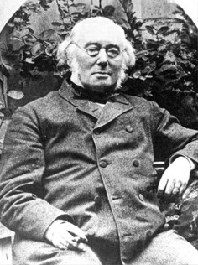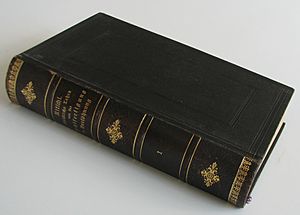Albrecht Ritschl facts for kids
Quick facts for kids
Albrecht Ritschl
|
|
|---|---|
 |
|
| Born | 25 March 1822 Berlin, Prussia
|
| Died | 20 March 1889 (aged 66) |
| Nationality | German |
| Alma mater | University of Halle |
| Spouse(s) |
Ida Rehbeck
(m. 1859; died 1869) |
| Scientific career | |
| Institutions | |
| Influences |
|
| Influenced |
|
Albrecht Benjamin Ritschl (born March 25, 1822 – died March 20, 1889) was an important German Protestant theologian. A theologian is someone who studies religious faith and God.
Starting in 1852, Ritschl taught about systematic theology. This is a way of organizing Christian beliefs. He believed that faith was a unique experience. It was not something that could be fully explained by facts or logic. Instead, faith came from personal values and judgments. He taught that Jesus' special role was best understood as showing God's message to people who trusted Him.
Who Was Albrecht Ritschl?
Albrecht Ritschl was born in Berlin, Germany. His father, Georg Karl Benjamin Ritschl, was a pastor. He later became a bishop in Pomerania.
Albrecht studied at several universities. These included Bonn, Halle, Heidelberg, and Tübingen. During his studies, he was influenced by different thinkers.
In 1845, he became interested in the Tübingen school of thought. This was a group of scholars who studied the New Testament. He wrote a book in 1846 about the Gospels. Later, he changed some of his ideas.
Ritschl became a professor of theology. He taught at the University of Bonn starting in 1852. Later, in 1864, he moved to the University of Göttingen. There, he was influenced by thinkers like Immanuel Kant and Friedrich Schleiermacher.
He wrote a major work called The Christian Doctrine of Justification and Reconciliation. This book was published between 1870 and 1874. It contained his main ideas about theology. He also wrote a history of Pietism, a religious movement. Ritschl passed away in Göttingen in 1889. His son, Otto Ritschl, also became a theologian.
Ritschl's Main Ideas
Ritschl wanted to continue the work of earlier thinkers like Martin Luther and Schleiermacher. He aimed to free religious faith from complicated philosophical ideas. His system of thought was shaped by several important ideas:
- From Immanuel Kant: The idea that moral knowledge is very important.
- From Friedrich Schleiermacher: The importance of Christian community and religious feelings.
- From Hermann Lotze: Ideas about knowledge and personality.
Ritschl tried to show that Kant's ideas about knowledge could fit with Lutheran beliefs. His work had a big impact on German religious thought. Many scholars followed his ideas in the late 1800s and early 1900s.
He believed that spiritual experience is real and important. For Ritschl, faith was the best way to understand the world. He saw the life of trusting God as a key fact. This fact could help explain everything else.
Ritschl focused on the religious experience of the Christian community. He believed that theology should start from the faith of the community. From this, it could build a complete view of the world and human life.
A core idea for Ritschl was that God is love. He believed God's love aims to bring humanity together in the "Kingdom of God." This idea was central to all his teachings.
He disagreed with using old Greek philosophy in theology. He felt that such philosophy was not deep enough for understanding faith. He thought it ignored the difference between nature and spirit.
Ritschl believed that religious judgments were about our moral and spiritual well-being. These judgments were different from purely factual ones. They were about how things relate to our deepest feelings.
Examples of His Theology
Here are some examples of Ritschl's specific theological ideas:
- God as Father: He saw God as a Father who actively works towards His purpose in the "kingdom." God's "Love" is His will to make this kingdom real. His "Righteousness" is His faithfulness to this goal.
- Christ's Role: For the Christian community, Jesus has a unique role as Founder and Redeemer. Ritschl believed Jesus perfectly showed God's message. He was an example of true religion. Jesus started the kingdom, and His spirit guides believers. Ritschl believed Jesus' Resurrection was a necessary part of Christian faith.
- Sin and Forgiveness: Ritschl saw sin as going against God's fatherly purpose. Guilt meant being separated from God's family. Redemption, justification, and forgiveness all meant the same thing: restoring this broken family relationship. He believed this restoration depended on Christ. Jesus kept His close relationship with God, even to His death. He then shared this relationship with His followers.
Ritschl did not focus on some traditional theological questions. For example, he did not discuss the "Two Nature" problem of Christ. He felt these ideas were not directly related to human experience.
His followers, like Wilhelm Herrmann, Julius Kaftan, and Adolf Harnack, developed his ideas further. They sometimes differed from him. However, they all agreed on the importance of faith-knowledge over abstract philosophy.
See also
 In Spanish: Albrecht Ritschl para niños
In Spanish: Albrecht Ritschl para niños
 | Tommie Smith |
 | Simone Manuel |
 | Shani Davis |
 | Simone Biles |
 | Alice Coachman |


